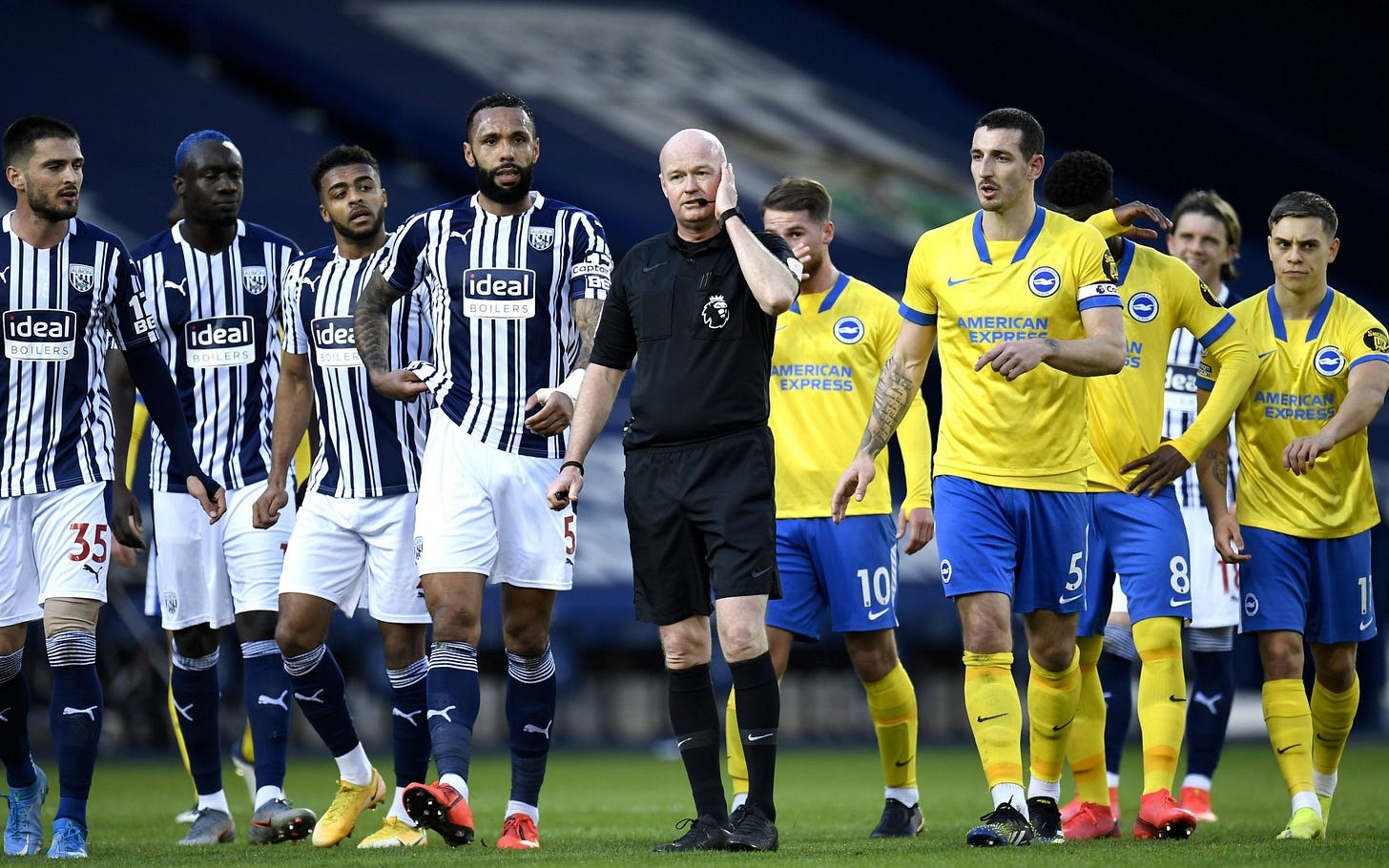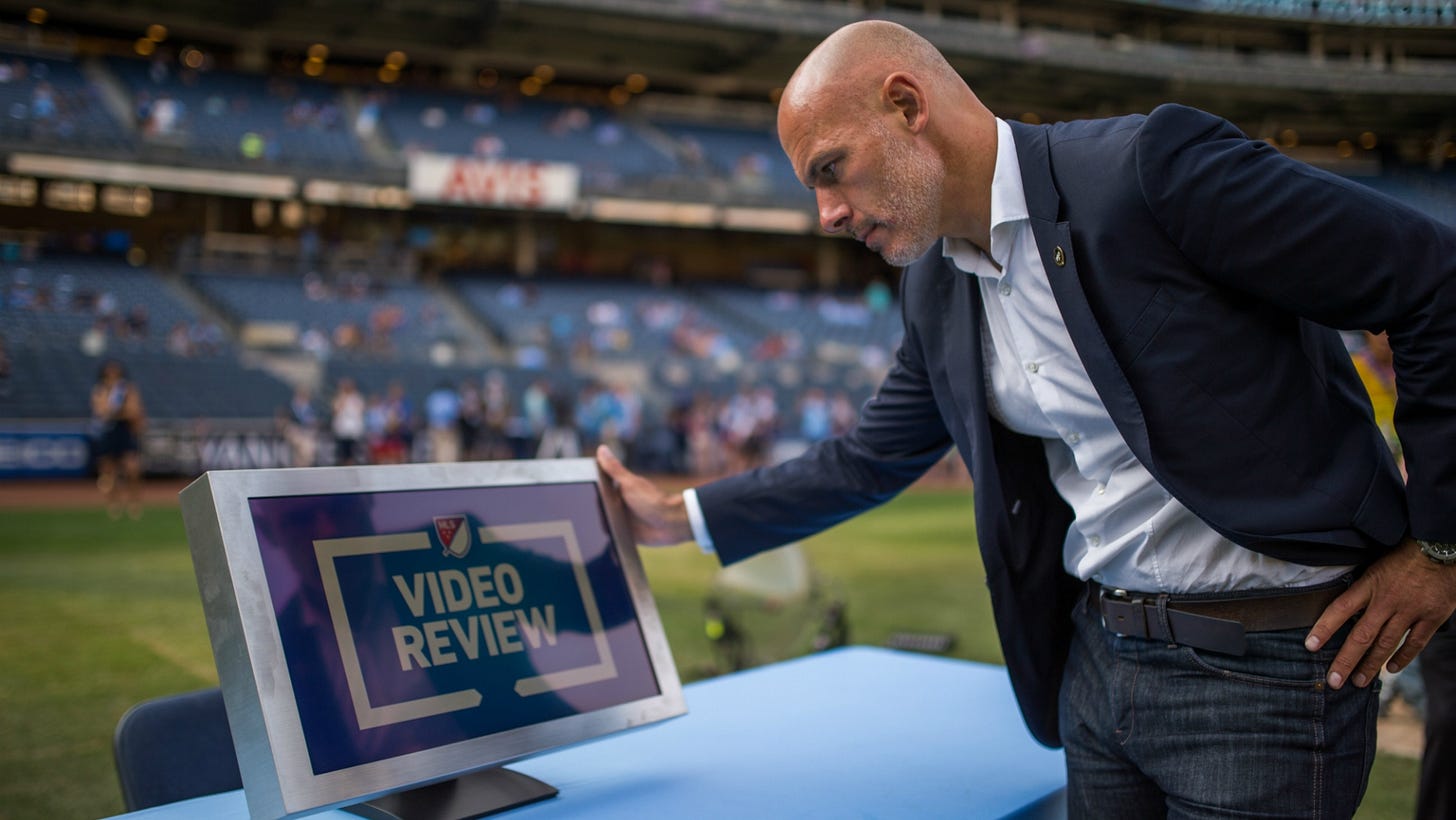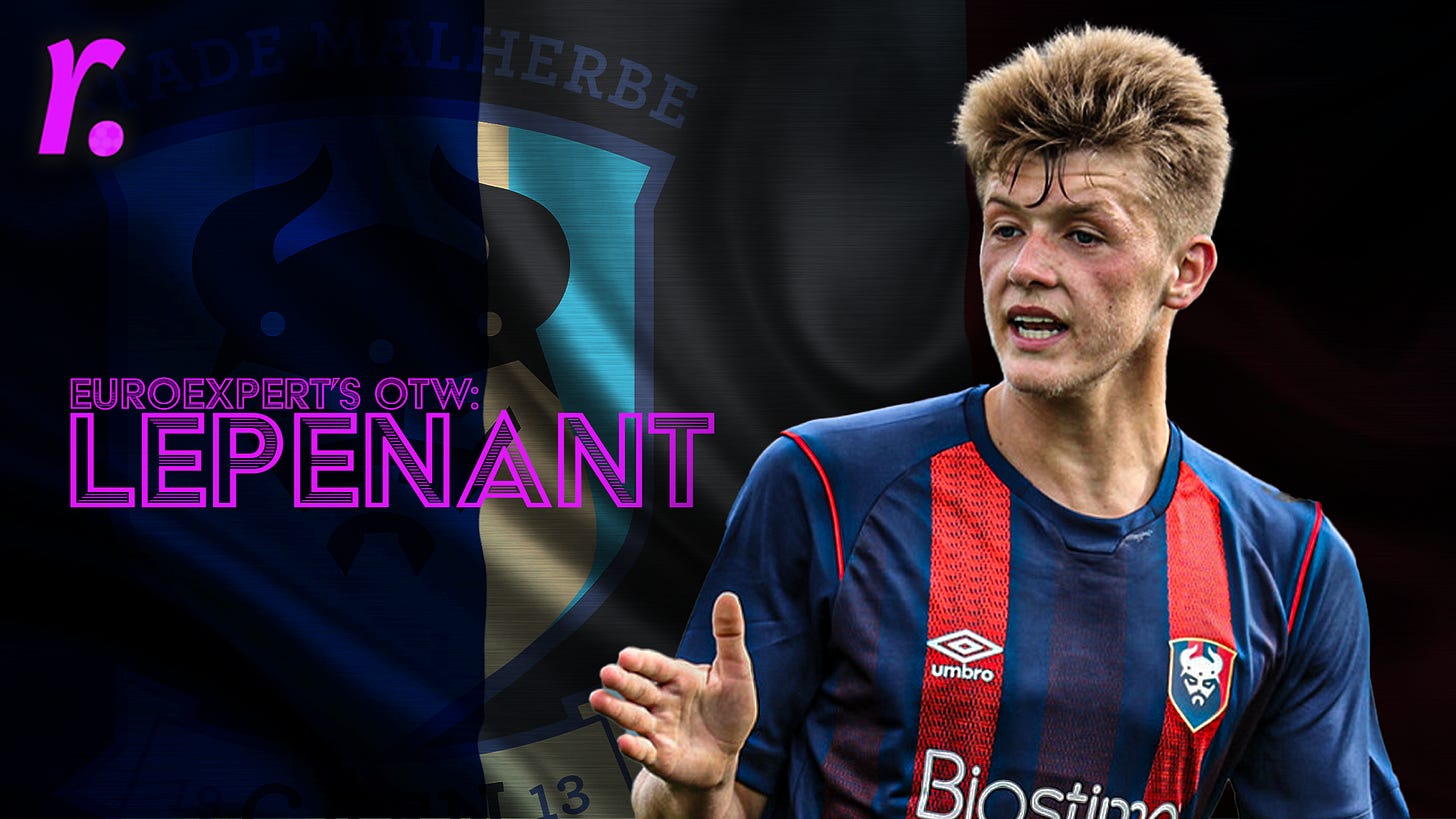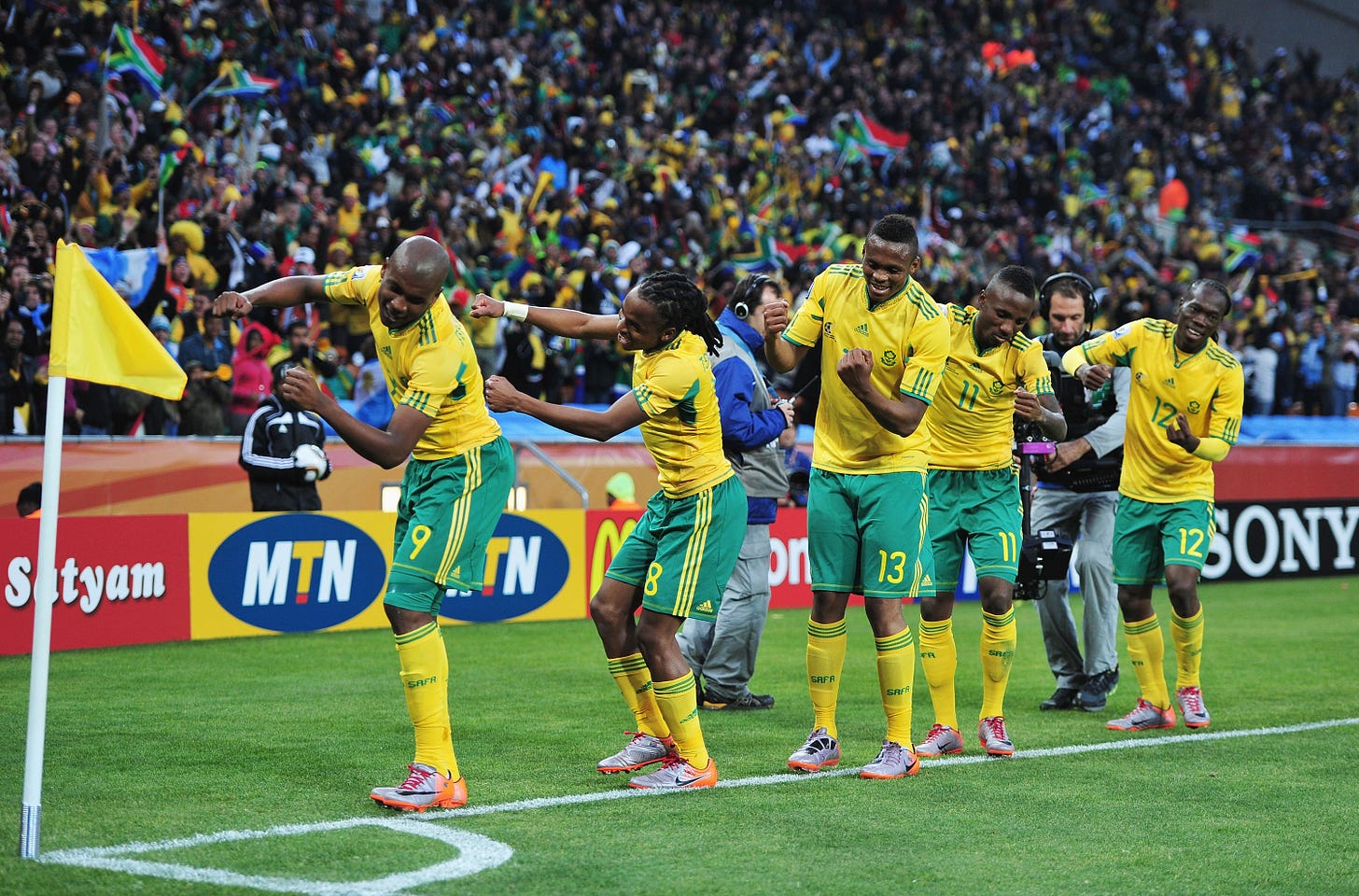Newsletter #002: The Old Lady Stuck in Time, A Nordic Tale As Captivating As Its Mythology & More...
In this edition of 'Revamp The Game': A Rise In Norwegian Football, a bleak struggle for Juventus, Howard Webb's somewhat welcome Premier League return and another Euro Expert: One To Watch.
#002
Ben kicks this week’s edition off with his graphical genius. We start with a tale from Norway and no, it has nothing to do with Erling Braut Haaland, instead, Ben showcases the stunning rise in form of Vålerenga, one of Oslo’s premier clubs. Kaustubh provides an in-depth analysis of the current crisis at Juventus, highlighting the failure of Allegri’s not so ‘allegro’ football. Chris returns with another insightful piece regarding the infamous former referee, Howard Webb, and his return to the Premier League as the new Chief refereeing officer of the PGMOL. Finally, as was the case last week, Alex (Euro Expert) asks you to take an interest in another one of Europe’s relatively unknown rising stars, Johann Lepenant. We conclude with ‘Ömer’s Outro’.
From Relegation Form To A European Qualification Fight: Digging Into Vålerenga’s 2022 Eliteserien Data
Ben Griffis
A Nordic Myth…Sponsored By Data
Vålerenga, one of Oslo’s premier football clubs, currently sit 5th in the Eliteserien after 22 matches (this article written before their match vs Sandefjord on Sept. 19th). On paper this is unsurprising, given that Vålerenga—nicknamed Enga by their faithful support—have been a constant mid-table presence for the last decade.
When we look further into their season, however, something rather surprising shows its face. A tale of two halves, or rather thirds, since the season is about two-thirds of the way complete. Relegation-level form marked the first half of their season so far (12 games). The second half of their season (the next 10 games) saw them as the 2nd-most in form team over that run, only behind league leaders Molde who won 9 and drew 1. Vålerenga managed 8 wins, a draw and a loss.
This chart below shows their dire form at the start of the season. They were in the relegation spots after round 12 before going on their current run of form that has seen them shoot away from relegation danger just 10 matches later.
For this article, I’ll dive a little deeper into their underlying expected goals (xG) data and results. Through this dive we’ll see how Enga got themselves into danger, how they rescued their form, and if we should expect them to continue this form into their final 8 matches this season.
The Master of the MA…
First, I have to quickly explain what a moving average is, as most of the data we’ll look at are moving averages. A moving average (MA) is simply the average of the past X events. For this article, I’m using the last 4 games, so we have 4-match MAs. So, starting on the 4th match in our data, our MA for that match is the average of matches 1-4. Then for the 5th match, the MA is the average of matches 2-5, and so on.
Moving averages help take away some game-by-game variance in metrics. Their use allows us to see the overall trends within and across seasons for a team. I prefer using a 4-match MA since that typically includes the 2 most recent home matches and 2 most recent away matches. It’s best to compare an even number of home/away matches since the home-pitch-advantage is well known (and very real).
So, with that background, let’s begin. First, let’s look at a major indicator of performance: expected goal difference (xGD).
We can see that Vålerenga have actually had a positive xGD for the vast majority of the season, including when they were relegation candidates. In fact, their xGD was increasing during that time as well. This increase has continued for much of their current recovery period, marked on this season’s graph. Their early season xGD form was also fairly similar to their last 4 seasons, despite being mid- or upper-table during that period in prior seasons.
This chart tells us that Enga were obviously not performing to their expected performance standards at the beginning of the season. We can see that in data as well by looking at Enga’s actual goal difference vs their expected goal difference (GD-xGD). A positive number would mean the club was over-performing their xGD on average, while a negative number indicates under-performance.
Right before they started their recovery form, Vålerenga recorded some of their worst under-performance of the past 5 years. The only period in the last 5 years with worse form was when they slipped from being 4th at the halfway-mark of the 2019 season to 10th at the end of the season after just 1 win in their last 16 matches.
We can see the stark and quick improvement in their GD-xGD numbers starting in match 13. There have only been 2 matches in their recovery period in which they have had a negative GD-xGD. Vålerenga have moved from under-performing by over 2 goals per game to over-performing by about 1.5 goals per game. A complete reversal, which will naturally make you question whether it is their attack, defence or maybe both that have gotten better.
To see that, we have to look at two data points: their actual goals vs expected goals (G-xG) and their actual goals conceded vs expected goal conceded (xGA-GA: I subtract goals against from xGA so that a positive value represents over-performance in all charts in this article). G-xG and xGA-GA are the two data points that comprise GD-xGD.
First off, we see an insane improvement in G-xG throughout their recovery period. Enga are currently over-performing their xG by over a goal per game, with little sign of that ending. This is great for escaping the drop; however, it could also mean that they are getting fairly lucky with their recently scored goals. While regression to 0 is not a given within a season, such high levels of over-performance can reverse at any given time.
Vålerenga have also made improvements, albeit not as great in magnitude, in their xGA-GA. They reversed their under-performance in goals conceded, but instead of over-performing, they are most likely performing as expected. We should see this as a positive, as there doesn’t appear to be any major “luck” factoring into their goals against at the moment.
The Chaotic Balance Of Performance…
So, how have Vålerenga reversed their abysmal form at the start of the season? They began the season under-performing in key metrics that can capture performance. Their underlying numbers suggested they should bounce back, and they did with flying colours. Enga are now over-performing their underlying xG while performing as expected in xGA, which is great for their season, but might also tell us that they are prone to slightly worse form in the remaining 8 fixtures.
This final chart shows each game’s xG and xGA, colour-coded by result and with each shape showing whether the game came in their first third of the season or their recovery period.
From this we can see their early season under-performance, with 3 positive xG games resulting in a loss, as well as their recent recovery, where 3 games with a negative xGD resulted in a win. Furthermore, their only loss since coming out of the danger zone was a match with a negative xGD, a good sign that they have in fact recovered from their poor form.
Vålerenga are in the fight to qualify for Europe at the moment. With 8 matches remaining, anything can happen; however, there does not appear to be written-in-stone evidence suggesting Enga’s performances will let up. Even if their over-performance in goal-scoring decreases, their expected goal difference—while taking a recent large negative turn—has been positive for the vast majority of the season. I expect the club to finish the season in dominant form, winning the majority of their matches. But time will tell if Enga can go from the relegation places into Conference League qualification, which is currently just a tantalising 5 points away.
Ben Griffis (@BeGriffis)
A Lack Of Allegro For Allegri: Misery, Trouble & An Old Lady Stuck In Time
Kaustubh Pandey
Black-And-White Truth For Juventus…
Simply put, Max Allegri is in trouble at Juventus. While it isn’t as if Juventus have never been struggling under Allegri, it feels rather desperate this time around. The Bianconeri did start off last season in poor form and this naturally drew comparisons to their start in the 2015/16 season. However, unlike that season, they could only recover to finish the 2021/22 season in fourth place.
Perhaps the signs were there all along with Juventus ranked 11th in Expected Goals (xG) last season. Even then, some of the Bianconeri faithful had expressed concerns about Allegri’s playing style and this was reflected by the manner in which Dusan Vlahovic struggled to receive regular chances for himself in the second-half of the campaign. The belief, at the club and amongst fans, was that with new signings in Filip Kostic, Angel Di Maria and Arkadiusz Milik, the ‘Juventus Way’ would change. Yet, for those who bore-witness to Allegri’s tactical approach throughout his first stint at the Allianz Stadium, it was always going to be very unlikely.
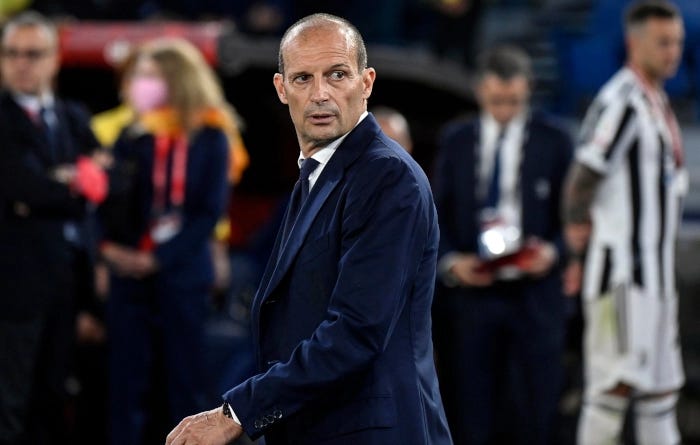
Whilst it is only fair that the fans and pundits alike hark back to the Ex-Milan manager’s previous stint at Juventus in order to draw some conclusions, that is where a lot of the uncomfortable truths begin to emerge from.
Juventus would have never lost to a side such as Monza back in the 2015/16 season. There were times when they could outscore lesser opposition by five or six goals. Perhaps this was down to a higher quality of player within the squad or perhaps we should consider the likelihood of a previously lesser standard of quality within the Serie A. In the 2010’s, it was a rarity to see Juventus not win the league by a country mile and them losing even a single game would send shockwaves throughout the league.
Tactical revolutions had not taken place within Serie A at that point. The Maurizio Sarri wave had not hit the waters at the coasts of many clubs, which were largely stuck in time, using tactics that followed the notorious ‘defence-first’ Italian way. There was a certain degree of commonality in the tactics used by the sides, with Juventus also thriving on a similar approach that relied on limited possession and quick transitions. This often allowed for the individual traits of footballers to thrive, whilst refraining from tying down players to a complex tactical system. On a weekly basis, Allegri could play to the strengths of his players, who most certainly possessed the talent to dominate Serie A.
Fallen Giants…
During this period, the other giants of Italian football were in their own financial mess. Milan jumped from one manager to another amidst financial concerns, whereas Inter were very much into what their fans now describe as the ‘banter era’ for the Nerazzurri. Erick Thohir’s tutelage brought about poor recruitment amongst financial restrictions and this was not helped by the questionable sacking of Roberto Mancini who was replaced by the woeful Frank de Boer. There were instances in which Thohir was spotted sleeping in the stands of the San Siro and corruption claims around the Indonesian further tarnished his and Inter’s reputation.
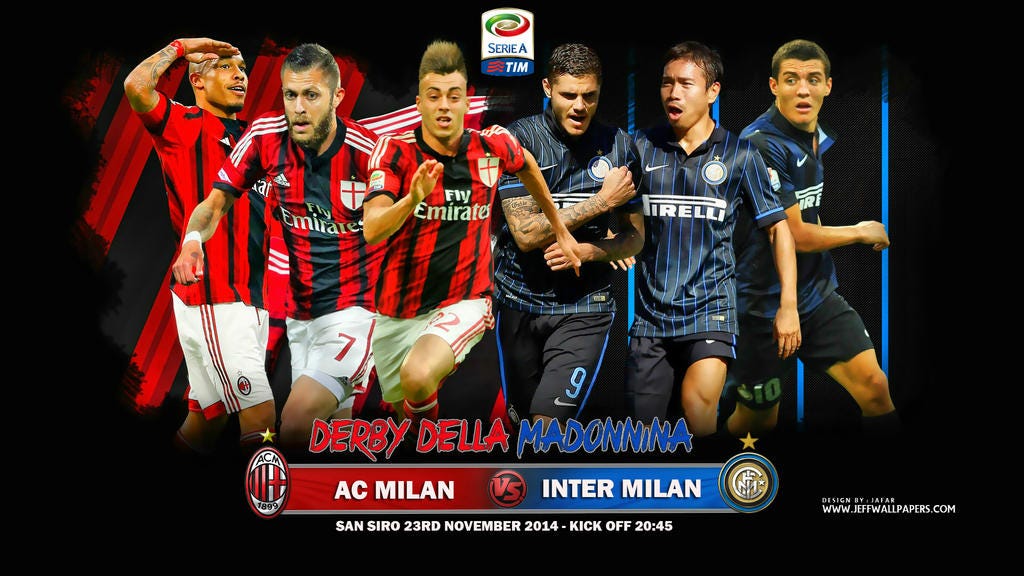
Roma did well to keep up with the Old Lady for a spell under Rudi Garcia however, the fact that the Giallorossi sold one of their biggest stars in Miralem Pjanic to Juventus spoke volumes about the Bianconeri’s stature in Calcio at that point in time. The signing of Gonzalo Higuain from arch-rivals Napoli, who posed the most genuine threat to Juventus during the mid-2010s also spoke volumes about Juventus’ superior commercial standing during that era.
Andrea Agnelli’s club was the first in Italy to fully commercialise around the late naughties, but this commercial status truly exploded with the introduction of Juventus’ new and atmospheric stadium in 2011. In a time where other Serie A sides sruggled to get by - (despite Inter’s Champions League win in 2010), Juventus had built a stadium of their own that was free of control from the local governing bodies. Even in 2022, one of Italian football’s major drawbacks is the bureaucratic levels they have to surpass in order to build a stadium of their own - ask current Fiorentina owner Rocco Commisso. Juventus achieved this freedom in 2011 and reaped the rewards of a rare revenue stream which snowballed into them becoming a much larger commercial and ultimately footballing entity than every other Serie A outfit.
Allegri’s Easy Strut To The Scudetto
As a result, whilst Italian football remained primitive in its tactics, Juventus reaped the rewards. When others had financial issues, the Bianconeri were never bothered about any financial restraints.

Essentially, it was all set up beautifully for Allegri. Antonio Conte had already given the side a distinct tactical identity during his record breaking stint at Juventus and Allegri only had to take it forward without changing too much. He would often use the same formation that Conte used during his time - the 3-5-2, while also utilising the largely successful roster of players already at the club. And if they did leave or lose prominence, there remained enough in the coffers to sign the right replacement - as evident from the captures of Pjanic and Higuain.
It was a completely different era of Italian football, with the country itself dealing with financial pressures of its own. Allegri only had to keep things simple, not over complicate his approach and maintain the happiness of his star players, utilising his able man-management skills. At the end of his first stint at Juventus, Allegri had made it clear that the side needed a transition and drastic changes had to be made. Allegri’s last season of stint one had produced the most dour football any of his sides had produced in Turin. Perhaps these signs should have been noted down more seriously.
New Decade, New Threats…
In 2021, the context changed. Juventus were no longer a settled club. The rivals had commercialised, Milan and Inter had re-gained prominence and Napoli had boosted their profile through excellent recruitment over the previous decade. The transition that Allegri had asked for back in 2019 hadn’t fully gone through yet, with Fabio Paratici heading to Tottenham too. The reliable core group of leaders that Allegri had in his first stint had dispersed, with only Giorgio Chiellini, Leonardo Bonucci and Paulo Dybala remaining.
More than that, Italian football had undergone a massive tactical shift. Calcio had become much more dynamic by 2021, with a new generation of manager, such as Roberto de Zerbi, Ivan Juric, Gian Piero Gasperini and Vincenzo Italiano all notorious for using much more eye-catching footballing methods.
Juventus had brought in Maurizio Sarri to overlook a long-term rebuild but sacked him within a season. They hired Andrea Pirlo not long after bringing him in initially as the manager of the youth side at Juventus. When the rebuild was needed, the club went for a man that had not seen any of this new-found chaos at the club. Pavel Nedved and Agnelli maintained the firm belief that pragmatism still had a place in today’s modern game.
It is easy to agree with Allegri when he delivers regular spiels about the lack of leaders in the current side. The era of Gigi Buffon, Giorgio Chiellini and Claudio Marchisio has passed. Football perhaps in general is lacking in this regard, but I digress, that remains a conversation for another time. Even though Juventus did bring in Kostic and Di Maria, both with vast footballing experience, neither have ever been known to be imperious dressing room leaders.
It is also fair to agree with Allegri when he argues that Juventus are missing many of their key players - most notably, Federico Chiesa and Paul Pogba. However, that should not excuse the mighty Juventus from struggling to beat Monza and Salernitana.
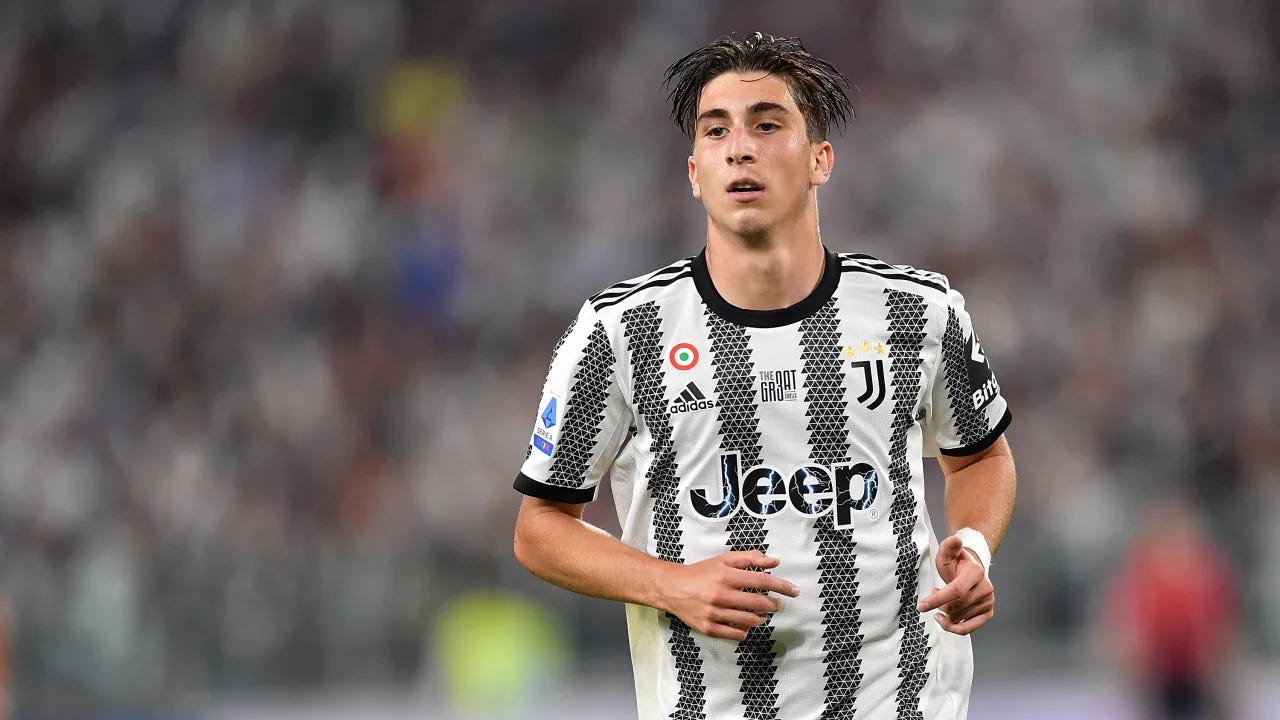
The World Does Not Stand Still…
As Allegri totters on the edge, with the Bianconeri fans shouting expletives from the stands, Juventus have a season to salvage. Allegri was never the right appointment in 2021 considering where the club stood with a much younger team than what they had in 2015. Whatever happens, the next appointment has to be something closer to what Juventus lost in Sarri or Pirlo. They need someone who sets the tone for how the game should and is played by a fresh and hungry new generation of player. These footballers do not need to rely on bleak verbiage around ‘mentality’ and ‘leaders’ when the wrong precedent has been set by higher-ups for the past three years.
Whether that happens or not remains to be seen. This is Juventus in 2022 - a club that craves a swift return to their recent glory days as Italy’s premier club. Yet, the questions remain, is the Old Lady stuck in time? And, does it require a new generation of leader in order to revive the success of the club?
Kaustubh Pandey (@kaus_pandey17)
Is Howard Webb The Man To Solve VAR? English Football’s Most Current And Concerning Crisis.
Chris Stonadge
VAR(Y) WORRYING
In March 2021, I wrote a piece called ‘VAR, referees and the rules are all inadequate – and it won’t change under the current regime’.
The match that had preceded was a tense fixture between West Bromwich Albion and Brighton and Hove Albion at the Hawthorns, where the home side held on to a 1-0 win amidst extraordinary controversy.
The Baggies, under Sam Allardyce, were fighting a losing battle against relegation. His side conceded two penalties, both missed. Sandwiched between, referee Lee Mason disallowed a Brighton goal, then allowed it before disallowing it again.
At this point, there were no crowds in the Premier League - but if there were, the uproar, confusion and bemusement would have been rife.
It was, in my memory, rife enough on Graham Potter’s bench and amongst the Brighton media staff as it was.
Since the introduction of VAR, there was always going to be teething issues. Three years in, standards have ‘fallen’ in the words of former Premier League assistant referee Glenn Turner.
‘Help Me Howard Webb, You’re My Only Hope…’
A man so key in its introduction across North America, Howard Webb, has recently been appointed as the new chief refereeing officer of the PGMOL, replacing Mike Riley in a differently created leadership role in the organisation.
He will return to his home country once his contract ends in October, having spent six years helping to improve officiating standards in the MLS.
Webb was well known as one of the world’s most established referees during his time, taking charge of Spain’s 1-0 defeat of the Netherlands in the 2010 World Cup final amongst many other big footballing occasions.
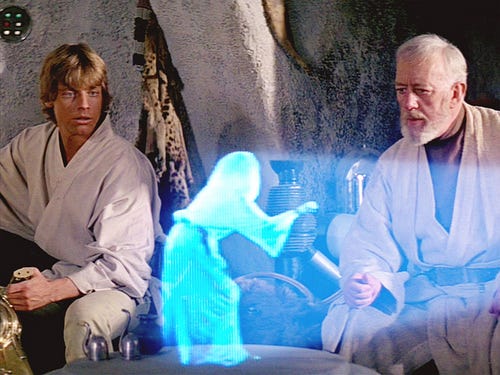
On his appointment, Webb said: “I will be managing the refereeing in the Premier League and the Football League, all the leagues that the PGMOL serves, ultimately looking to improve the standard of officiating [and] working with the team that’s there,” Webb added.
“Of course the game doesn’t get any easier. The playing standards get higher and the referees are expected to be better and better year on year wherever you are in the world and for sure in England, where there’s so much scrutiny and attention.
“To be working in that kind of pressure environment for us, for people like me, is great and I am looking forward to being part of that. There’s a lot of investment going into refereeing in England through the Elite Referee Development Plan and my role is part of that, so exciting times.”
Webb worked as a police officer in the South Yorkshire department before becoming a professional official, taking charge of his first match in 2003 - a 0-0 draw between Fulham and Wolverhampton Wanderers.
Across an illustrious 13-year career, he took charge of 534 matches, distributing 1694 yellow cards and 68 reds.
The main USP for Webb was his true advocation for technology in the game. Several panacean solutions have been thrusted upon football which are still tarnished by human error, but Webb’s introduction could genuinely be impactful in this sector.
“I’m a strong advocate for VAR. I think it’s been a positive introduction to try to eliminate some areas that as an active official, I used to really hate when they happened in my games. Sometimes you didn’t have all the information in the moment to make the best decision and now we’ve got a tool that helps us do that.”
Riley Ridiculed…
Revamp The Game spoke to Glenn Turner, who also spoke to me last year, about Webb’s appointment and the general standard of officiating at the present moment.
We spoke back in Feb 2021 about the state of refereeing in the Premier League. Has it improved both on-field and VAR?
“I see no improvement from where we were 18 months ago. If anything, the standard has fallen further. Referees and Assistants are reluctant to make decisions, instead being slavishly reliant upon VAR.”
What is your initial reaction to Howard Webb's appointment as the PGMOL Chief, and what did you think of his work in the MLS?
“My initial reaction is one of relief. Relief that Riley would be out of the way, and replaced by Webby. He’s a sensible and good manager who has moved the MLS forwards during his time in the USA.”
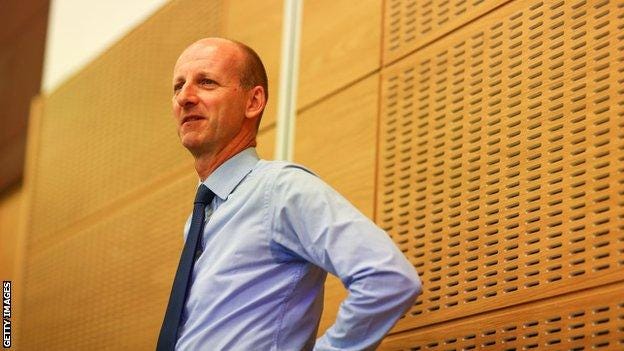
Webb was a keen instigator for VAR's introduction in the states - do you think that bears well for its use in England?
“Yes. VAR isn’t the problem. It works well as a system when used correctly, as the MLS has shown. The problems in England lay at Riley’s door, and relate to his dreadful management and promotion of poor referees.”
You made clear your feelings towards Mr Riley in the previous chat we had - do you think that Webb is a more capable replacement?
“Undoubtedly. My only concern is that the job title has changed. I hope that doesn’t mean Riley is going to be hanging around. He needs to go. Completely.”
And how do you see his appointment affecting the standard in the league?
“Let’s face facts. Standards cannot get any lower. England used to be a hotbed for refereeing talent throughout the 80s/90s and early 2000s. It’s only since Riley took over that we’ve become something of a joke in world football, not having match officials at major tournaments. Too much talent has been allowed to walk away and be lost to the game, take Mark Halsey as a prime example. A superb motivator of others who was frozen out by Riley.
I hope Webby brings him into the fold ASAP.”
Chris Stonadge (@ChrisStonadge)
THE EURO EXPERT’S ONE TO WATCH: JOHANN LEPENANT
Alex Barker
Alex (The Euro Expert) returns with another one to watch. This time he details Johann Lepenant, who put in a stellar debut performance against footballing giant PSG on Sunday Night.
Granville’s Smoothest Operator…
A few seconds over 45 minutes have passed; Lyon are 0-1 down to PSG at home, with a baying crowd expecting goals from their talented but consistently underwhelming side. What does Peter Bosz do?
If you guessed ‘sub on a defensive midfielder’, you get full marks. The thing is, bringing Johann Lepenant into the mix was a smart move that paid off. Lyon switched from their 4-4-2 shape into their usual 4-3-3, one where the 19-year-old French midfielder has been a mainstay, and played le Parisen off the park.
They went from having 29% possession in the first half to 40.5% in the second, with Lepenant completing 23 passes as well as winning five tackles, the second most on the pitch.
A neat, slight midfielder, Lepenant arrived from Caen this summer at €6m fee after he started 35 games in Ligue 2. He’s already been capped eight times for the French U20s, and it’s clear to see why.
His physicality isn’t too impressive, but his match IQ stands out even at a glance. Within a second of receiving the ball, he’s already passing it off to a teammate. He’s completed 92.7% of his passes so far, averaging over 70 p90 as the lone pivot of Lyon’s side.
This was what was particularly impressive against PSG on Sunday night, as he lost the ball just twice. Lepenant was instrumental in Lyon building possession and increasing the tempo of their build up, pinning Christopher Galtier’s side back in the last 20 minutes of the game.
Standing at around 5ft 11, the former Granville academy star is a nippy dribbler too. He relies on that to escape sticky situations, something he will face more often as French Football continues to embrace more of the pressing trends across Europe.
Essentially, watch out for the name Johann Lepenant. He’s a very pleasing defensive midfielder, reminiscent of Jorginho but perhaps with a little more on the dribbling front. If he follows in the footsteps of recent Lyon youngsters, such as Bruno Guimarães, it won’t be long until the whole continent starts raving about the Frenchman.
(Above is a video compilation of Johann Lepenant demonstrating his talent prior to his big move to Lyon)
Alex Barker (The Euro Expert) (@EuroExpert_)
‘Ömer’s Outro’:
Ömer Çayir
There we have it folks, #002 is done. The support you all gave to #001 was genuinely incredible and I do hope you enjoyed this edition.
Beyond The Walls Of The Cave…
I want to speak to you guys about something vitally important to me personally. Yet, it is also a constant that is deeply engraved within the soul and philosophy of Revamp The Game.
Vålarenga headlined today’s issue. Why? You may ask. Nobody really knows ‘Vålerenga’, so heck, who really cares. Well we do. Football is a global game and we can often ignorantly get wrapped up in the comfort our own footballing bubble. the Top European Leagues occupy our TV screens endlessly and their players equally engage as much interest, to the extent in which they can form their own star personality. Ben’s piece about Vålerenga is just one of many unheard but fascinating stories circulating the global football world. At Revamp we feel a sense of duty to broaden the horizons of our readers and help them discover unknown footballing elements. Yes, certain discussions, such as the potential Premier League All-Star Game are of great interest to all members of the footballing industry and we will undoubtedly engage in such debate. But, here’s a reminder to you, whether it be in football or life, never fear to branch out into the unknown. Do not confine yourself to a world within a world for there is beauty and knowledge to be discovered within all aspects of this immensely vast place. So I leave you on this, ‘Seek the unknown’.
This line of thinking is heavily inspired by Plato’s ‘allegory of the cave’ and I greatly encourage you to read up on this Socratic dialogue in order to further understand my point.
Thank you! Keep Safe and enjoy the coming weeks of international football! See you next week. :)














